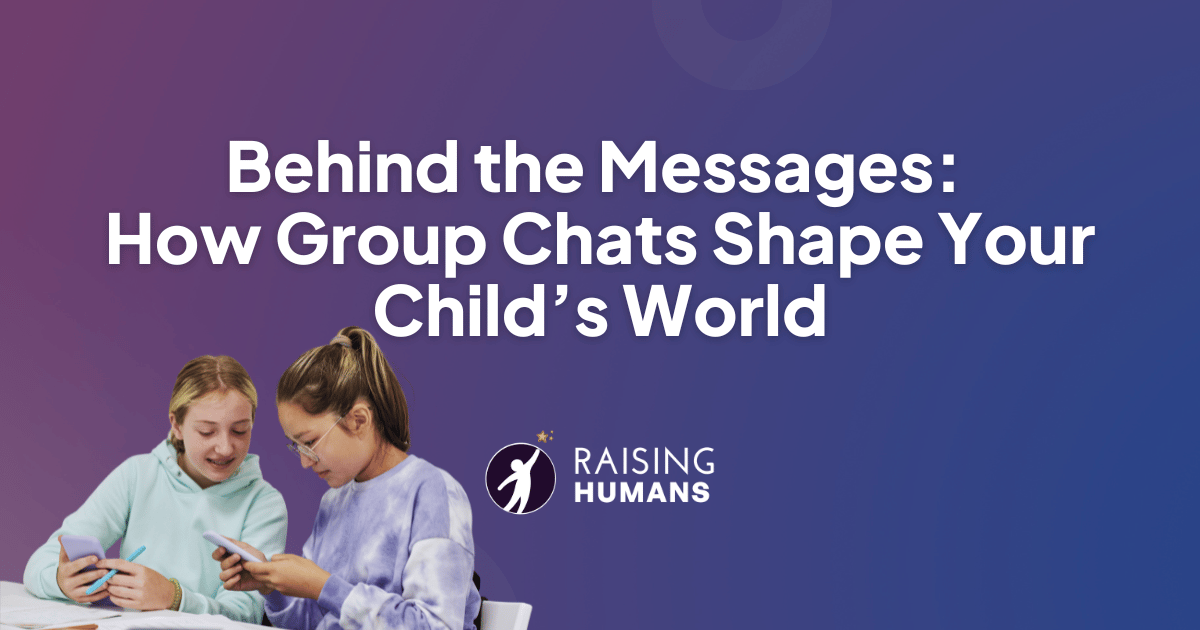Hey, Raising Humans Crew!
Even when your child seems happy and confident, the world of group chats, DMs, and private threads can quietly shape how they see themselves and their friendships. Moments of exclusion, misunderstandings, or just feeling out of the loop can sting, sometimes more than you might realize.
This week, we are taking an honest, inside look at the digital spaces where your child’s friendships grow and shift. No fear, no judgment, just understanding, guidance, and ways you can help them navigate these hidden social currents with resilience and confidence.
Also in this edition:
Survey Says: We asked, you answered! Here's what parents really think about last week's big question.
🧠 The Think Tank: Cast your vote in this week’s poll!

Inside Your Child’s Digital Friendships

You might not see it, but your child’s friendships are constantly evolving in group chats and DMs.
Studies show that over 70% of tweens and teens communicate with friends primarily through messaging apps, which means a lot of their social life happens out of sight.
A simple “seen” without a reply can feel like rejection, a joke you don’t understand can make them feel out of place, and being left out of a thread can sting long after the phone is put down.
Behind every ping and notification, your child is learning who they belong with, who they can trust, and how to navigate social pressures that can feel overwhelming even to adults. Social exclusion in digital spaces can impact self-esteem and increase anxiety, yet at the same time, positive online connections can foster closeness, empathy, and communication skills.
Understanding these hidden dynamics can help you be the guide they need… someone who sees, listens, and helps them navigate the tricky world of online relationships with resilience and care.
With the right support, your child can enjoy the benefits of digital friendships while learning to handle the challenges.

Find out why 1M+ professionals read Superhuman AI daily.
AI won't take over the world. People who know how to use AI will.
Here's how to stay ahead with AI:
Sign up for Superhuman AI. The AI newsletter read by 1M+ pros.
Master AI tools, tutorials, and news in just 3 minutes a day.
Become 10X more productive using AI.

When Being Left Out Hurts

It may seem small to you, but for your child, missing a message, being left out of a group chat, or not understanding an inside joke can feel devastating.
Research shows that social exclusion online can trigger the same emotional pain as being excluded in person.
Your child might withdraw, become unusually quiet, or act irritable after a day of digital drama, even if they don’t say a word about it.
You can help by noticing subtle signs: hesitation to check their phone, mood changes after texting with friends, or repeatedly asking questions about who is “in” and who is “out.”
These moments are opportunities to guide them in understanding that friendships are complex and that setbacks do not define their worth.
Encourage your child to talk about how they feel and model healthy coping strategies. Remind them that everyone experiences bumps in social connections, online or offline.
Helping your child process these feelings builds resilience, reinforces self-worth, and prepares them to handle future social challenges with confidence.

Want to strengthen your relationship in just 15 minutes?

The Sunday 15 is a game-changer if you know how to use it consistently.
Discover how this simple weekly ritual can transform both your communication and connection to build a stronger partnership together.
Learn to prevent conflict, enhance understanding, and foster intimacy with the power of intentional check-ins.

Supporting Without Snooping

It’s natural to worry when so much of your child’s social life happens behind a screen. You want to protect them, but constantly checking their phone can damage trust and make them retreat further. The key is staying connected while respecting their privacy.
Here are some ways to support your child without snooping:
Ask, Don’t Inspect: Invite conversations about their day and friends in a curious, non-judgmental way. “What was the funniest thing that happened in your chats today?” opens dialogue without pressure.
Share Your Own Stories: Talk about times you felt left out or misunderstood. This normalizes social ups and downs and shows them they aren’t alone.
Set Digital Check-Ins Together: Agree on times to discuss online friendships, rather than monitoring secretly. It gives your child a sense of control while keeping communication open.
Teach Digital Problem-Solving: Encourage them to think through conflicts before reacting, whether it’s ignoring a mean comment, responding thoughtfully, or asking a trusted adult for guidance.
Praise Emotional Awareness: Notice when they express feelings about social situations. Validating their emotions reinforces self-worth and shows them that you are a safe person to talk to.
By guiding rather than controlling, you help your child develop confidence, resilience, and judgment in their digital world. Trust grows, and so does their ability to navigate social challenges independently.


Last week, we asked: Should schools assign online homework when kids already spend so much time on screens?
Here’s what parents said:
🟨🟨🟨🟨⬜️⬜️ 🖥️ No — paper and pencil are better for focus
🟩🟩🟩🟩🟩🟩 🖥️ A mix — balance is the key
The majority of parents favor a balanced approach, recognizing the value of digital tools while also appreciating the benefits of traditional methods for focus and learning.

We’re asking parents like you to share their thoughts on topics that matter each week! Cast your vote and see what others think! We’ll chat more about the results next week. 👀
When it comes to your child’s group chats and DMs, which approach best describes how you guide them?

Focus Friend by Hank Green – This new app is taking off fast, helping kids stay focused while learning and connecting with friends in safe, structured ways. It’s perfect for reducing digital distractions while still fostering social interaction.
PowerPair Newsletter & the Sunday 15 Weekly Ritual Template – If you’re looking to strengthen your communication and connection at home, this is a game-changer. The “Sunday 15” weekly ritual is simple but powerful: set aside 15 minutes to check in intentionally. Use the PDF template to prevent conflict, enhance understanding, and build trust and intimacy. When applied consistently, it can transform relationships and give your child a model for healthy communication.
Bark – Monitors texts, emails, and social media for potential risks like bullying, threats, or unsafe content. Alerts parents discreetly while maintaining kids’ privacy.
Digital Compass by Common Sense Media – An award-winning game for students in grades 6–8 teach kids to make safe, responsible, and ethical online choices.

Until Next Week…
The world behind the screen can feel invisible, but your child’s experiences in group chats, DMs, and digital threads are shaping who they are and how they see themselves.
By staying curious, listening without judgment, and offering guidance without intrusion, you help them build resilience, confidence, and healthy social skills that will last a lifetime.
Thanks for joining us in raising kind, capable, and confident humans. We’re so glad you’re here.
❤️ Loved this issue? Have thoughts, questions, or topic ideas?
Share your vote below or drop us a note at [email protected].
What did you think about this week's newsletter?



